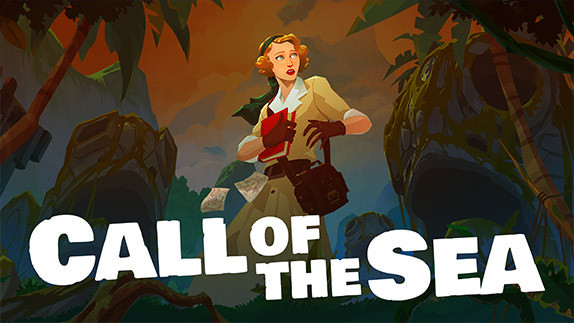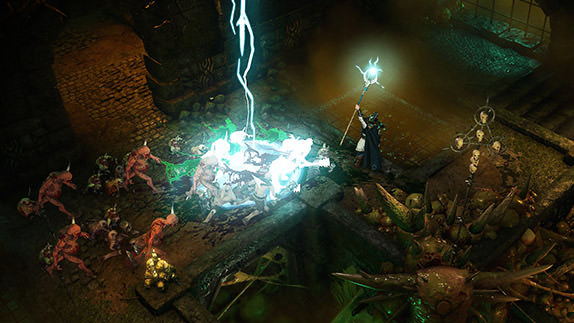Divinity: Original Sin Review

 By Kevin Mitchell | Posted: August 20, 2014
By Kevin Mitchell | Posted: August 20, 2014
Divinity: Original Sin reignited my love for PC role-playing games by successfully bringing old-school concepts into a perfectly designed turn-based RPG experience. Through the choices in the game and the well-written dialogue, you will find yourself fully immersed in the game.
Before beginning your adventure, you must customize your starting two main characters. There is a wide selection of preset classes to choose from, but enthusiasts may want to modify the starting skills and stats to fit their specific play style. I chose to go with the preset wizard and cleric class. Once you confirm the classes you would like to use, you may modify the appearance of your two heroes. The customization isn't vast, but there are enough options to ensure your character is unique. The portraits used throughout are pre-made, allowing you to choose from a handful of different choices. I had a hard time finding one that matched my character, resulting in updating my character's appearance to match the portrait. A minor issue, but something in me couldn't handle portraits that didn't match my characters. The first time through the character creation, I forgot to update the portrait, giving my character the default bald appearance for a wizard with flowing dark blue hair.
After getting acclimated to the basic movement controls, you'll be clicking around the environment to move your party. Clicking close to your character, they will walk or slowly jog into place but will pick up the pace if you need them to traverse greater distance. While you will start the game off with two characters, you will gain an additional two party members on your adventure for a full team of four. Larian has already promised additional characters to choose from via future updates. Your team will move in unison, with a handful of different formations, such as in a box shape, a "V" or even a single file line to hide your numbers. With a world with many hazards and traps, you'll be switching formations depending on the situation. Unlinking your characters from each other allows your characters to move independently. You may want to do this to solve specific puzzles or to sneak up on foes.
The combat system in the game is completely turn-based; as soon as you encounter an enemy, the game will pause and begin combat turns. Unlike the hardcore RPGs of my youth, you won't have to deal with multiple resources, such as mana points. Everything is controlled by a single resource: action points. Action points build up over time and everything from attacking, healing, skills, and moving will cost a set amount of points. Running immediately up to an enemy with my cleric may seem like a good plan at first, but burning through all of my action points left me open to an attack. Keeping my wizard at a distance, I launched fireballs that required line of sight. One time I was on the side of a cliff, not realizing I was aiming directly at the wall. The fireball didn't go far; in fact, it set my wizard on fire. Before learning new spells, I used a one-two punch of saturating the area with oil and following it up with a perfectly placed fireball. There are many other types of elements that are pivotal to the battle system, allowing you to mess with water, electricity, ice, and others. Your other characters aren't immune to your attacks, so caution must be had at all times.
Not relying on heavily clad warriors, I used the environment to my advantage to overcome my foes. When I taunted a couple of skeletons to come dangerously close to a poison cloud, a well-placed fireball ignited the entire area. While I was tossing fireballs at various parts of the environment with my wizard, he isn't the only way to use the environment to your advantage. Barrels, crates, and other forms of objects are littered throughout the game. Although you may think they only exist for looting or breaking, they do serve an additional purpose. Characters with high enough strength are capable of picking these objects up and moving or tossing them at enemies. Depending on what is inside, it could turn the battle in your favor or reveal a secret passage.
I learned early on that Divinity: Original Sin is completely open to any play styles. This openness allows for multiple solutions to problems. At times you may make the wrong choice, but you must live with the consequences. At one point early in the game, two drunken mercenaries were guarding a bridge, not allowing anyone to get across, also thinking you are dangerous orcs. Ultimately, I was presented with two choices: go with them to their leader or kill them. I chose the latter, and after an intense fight, I looted their drunken corpses. Only moments later, I found myself engaged with other mercenaries from their group in a struggle against a group of orcs. With the orcs defeated, they begin to question where the other two mercenaries were. I kept my mouth shut and moved on, but thinking back, I should have taken care of them as well. Witnesses are never an option.
Curious, I decided to attack an NPC in a town, saving the game prior just in case things went sour. Almost immediately the entire town came to the aid of one of its citizens. I promptly loaded my save file and proceeded to not kill anyone in town from that point on, unless it was behind closed doors. Multiplayer allows for one of your friends to join you, essentially taking control of your second main character. At first, I was upset that other players had to control your character, instead of replacing it with their own created character, but once Marcus and I synced up beforehand to create the character he would want to play, we had a thoroughly enjoyable experience. Story events unfold through dialogue choices, and when you are playing multiplayer, your partner will have a say in the story.
Simply Put
Divinity: Original Sin provides endless opportunities for you to play the game how you want. You can spend hours doing nothing but talking to NPCs, or you can venture off into the wilderness slaughtering every beast you come across. The inclusion of cooperative play allows for you and a friend to go on an adventure together. At first I was overwhelmed by the complete freedom in the game, as many games tend to handhold players for the first few hours. Expect to spend well over 50 hours with your characters, and that's even without doing everything the game offers.
Note: Divinity: Original Sin was reviewed on PC. A digital copy of the game was provided by the publisher/developer.




